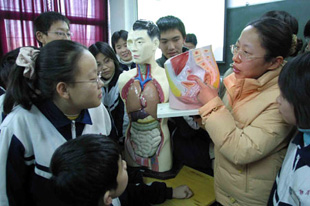| Home / Education / Photos | Tools: Save | Print | E-mail | Most Read |
| Let's Talk About Sex! |
| Adjust font size: |
Yang Yang (17) sits in the hospital corridor with her school bag on her lap. She's waiting for the results of pregnancy test. Next to the high school senior is her boyfriend Li Jun who's also 17. He's tossing a bottle of mineral water around. About 15 minutes later the results arrive. She's pregnant. These teenage lovers don't look the least bit troubled. "Gee, we could all go to school together," the boy quipped as he nodded at Yang Yang's tummy. "Get lost!" Yang pushed Li gaily. "I don't want it. It will make me fat and ugly." "OK, I don't care," the boy said. "Let's go somewhere and have some fun." The two giggle all the way to the door. A hospital gynecologist said almost all adolescents involved in early pregnancies, boys and girls, know little about how to avoid unintended pregnancy or what it means to their future lives. Lack of education and awareness about sex has caused a sharp rise in unwanted pregnancies and in some provinces teenage abortions have more than doubled.
Statistics released by the Family Planning Research Institute of Chongqing Municipality in southwest China show teenage abortions jumped from 13 percent in 1998 to 33.6 percent in 2004. The results of a sample survey early this year on the awareness of reproductive health among students at four universities in Beijing were equally alarming, the Health News has reported. Of 6,000 surveyed students 80 percent had only a vague idea about sexual reproduction. Only 5 percent said they'd received sex education at school. More than 90 percent of students said they'd learned about sex from newspapers, magazines, the Internet or from their peers. All the students surveyed agreed they needed a wider range of knowledge about reproductive health covering sexual psychology, morality, contraceptives and sexually transmitted disease prevention. Health experts say sex education is desperately needed in Chinese classrooms where such lessons are largely non-existent at present. "Teachers take sex education as a physiology or medical course so that they normally tell students where and what male and female genitalia are instead of discussing how to be a man or woman and how to avoid pregnancy," said sociologist Li Dun. Figures from the National Statistics Bureau suggest that in 2004 the country had 327 million people aged 10 to 24. This accounts for 26 percent of the total population. The average age for Chinese teenagers reaching puberty is 12-13. In other words there are 20 million boys and girls who reach their physical sexual maturity every year. However, traditional values still have an effect on girls in China. "Many girls subconsciously believe that whoever knows more about sex is morally loose," said Sun Yunxiao, deputy director of the China Juvenile Development Research Centre. The ubiquitous ads for painless abortion also have a bad influence on young people. Many believed abortion was an easy answer. Teenage girls were not worried about becoming pregnant and teenage boys failed to take responsibility for their actions. In addition to the government's commitment, Sun said," A prudential policy and a complete system for the development of sex education are necessary if we want to curb adolescent pregnancy." Provincial governments are taking action and the mayors of 10 major cities have signed special documents to address adolescent pregnancy. Along with their counterparts from 54 cities around the world the mayors of Shanghai, Chongqing and Suzhou have put their signatures to the Suzhou Proclamation. This demonstrates their resolve to fight such problems and diseases as HIV/AIDS, alcohol and tobacco abuse and teenage pregnancy which can all jeopardize the quality of life for young people in urban communities. The signing took place in October at the Second General Assembly and Conference of the Alliance for Healthy Cities in the city of Suzhou in Jiangsu Province. Sociologist Li Dun with the Chinese Academy of Social Sciences commented, "This is a positive move showing that city governments are changing from turning a blind eye to teenage pregnancy to confronting the problem in vulnerable social groups." The problem presents not only a menace to teenagers' health but also to urban public health at large. "The tendency of sex liberation together with our failing sex education is escalating premarital pregnancy into a modern urban public health problem in China," said Li. And pregnant adolescents often suffer from psychological problems. According to an ongoing research project on the psychology and social ability of pregnant teenagers, conducted by the Maternity and Children Care Hospital of Xuanwu District in Beijing, most of the girls in this group already have problems with self-esteem, self-confidence and self-consciousness. "This group of young women tends to be compliant to any demand from their teenage boy friends," said Li Yuan, a doctor responsible for the adolescent consulting clinic at the hospital. "And their knowledge of contraception and reproduction health is almost nil." (China Daily December 6, 2006) |
| Tools: Save | Print | E-mail | Most Read |
 |
| Related Stories |
|
